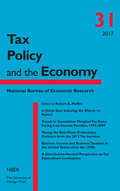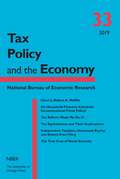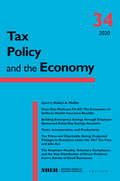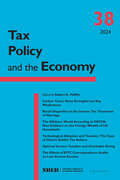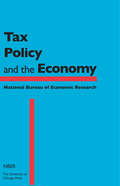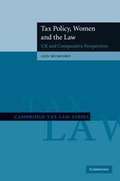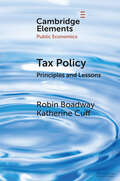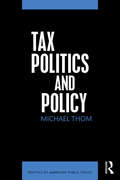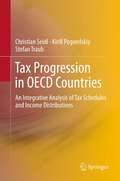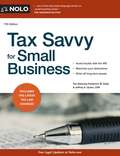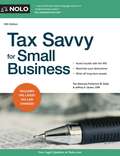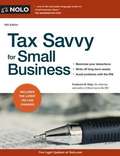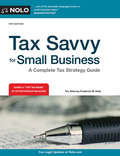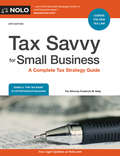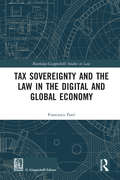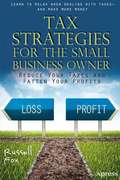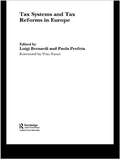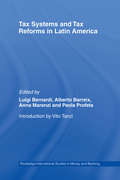- Table View
- List View
Tax Policy and the Economy, Volume 31 (National Bureau of Economic Research Tax Policy and the Economy)
by The University of Chicago PressThe papers in Tax Policy and the Economy Volume 31 are all directly related to important and often long-standing issues, often including how transfer programs affect tax rates and behavior. In the first paper, Alan Auerbach, Laurence Kotlikoff, Darryl Koehler, and Manni Yu take a lifetime perspective on the marginal tax rates facing older individuals and families arising from a comprehensive set of sources. In the second, Gizem Kosar and Robert A. Moffitt provide new estimates of the cumulative marginal tax rates facing low-income families over the period 1997-2007. In the third paper, Emmanuel Saez presents evidence on the elasticity of taxable income with respect to tax rates, drawing on data from the 2013 federal income tax reform. In the fourth, Conor Clarke and Wojciech Kopczuk survey the treatment of business income taxation in the United States since the 1950s, providing new data on how business income and its taxation have evolved over time. In the fifth paper, Louis Kaplow argues that the reduction in statutory tax rates from base-broadening may not reduce effective marginal tax rates on households.
Tax Policy and the Economy, Volume 33 (National Bureau of Economic Research Tax Policy and the Economy #33)
by The University of Chicago PressThis volume presents five new studies on taxation and government transfer programs. Alexander Blocker, Laurence Kotlikoff, Stephen Ross, and Sergio Villar Vallenas show how asset pricing can be used to value implicit fiscal debts, which are currently rarely measured or adjusted for risk, while accounting for risk properties. They apply their methodology to study Social Security. Michelle Hanson, Jeffrey Hoopes, and Joel Slemrod examine the effects of the Tax Cuts and Jobs Act on corporation behavior and on firms’ statements about their behavior. They focus on for four outcomes: bonuses, investment, share repurchases, and dividends. Scott Baker, Lorenz Kueng, Leslie McGranahan, and Brian Melzer explore whether “unconventional” fiscal policy in the form of pre-announced consumption tax changes can shift durables purchases intertemporally, how it such shifts are affected by consumer credit. Alan Auerbach discusses “tax equivalences,” disparate sets of policies that have the same economic effects, and also illustrates when these equivalences break down. Jeffrey Liebman and Daniel Ramsey use data from NBER’s TAXSIM model to investigate the equity implications of a switch from joint to independent taxation that could occur in conjunction with adoption of return-free tax filing.
Tax Policy and the Economy, Volume 34 (National Bureau of Economic Research Tax Policy and the Economy #34)
by The University of Chicago PressThis volume presents five new studies on current topics in taxation and government spending. Mark Shepard, Katherine Baicker, and Jonathan Skinner explore implementation aspects of a Medicare-for-All program, which provides a uniform health insurance benefit to everyone, and contrast it with a program providing a basic benefit that can be supplemented voluntarily. John Beshears, James Choi, Mark Iwry, David John, David Laibson, and Brigitte Madrian examine the design and feasibility of firm-sponsored “rainy day funds,” short-term savings accounts for employees that can be used when faced with temporary periods of high expenditure. Robert Barro and Brian Wheaton investigate the impact of taxation on choice of corporate form, on the formation and legal structure of new businesses, and indirectly on productivity in the economy. Jonathan Meer and Benjamin Priday examine the impact of the 2017 federal income tax reform, which reduced marginal tax rates and the incentive for charitable giving, on such giving. Finally, Casey Mulligan analyzes the impact of the Affordable Care Act on whether firms employ fewer than 50 employees, the employment threshold below which they are exempt from the requirement to provide health insurance to their employees.
Tax Policy and the Economy, Volume 37 (Tax Policy and the Economy #37)
by The University of Chicago PressTimely and authoritative research on the latest issues in tax policy. Tax Policy and the Economy publishes current academic research on taxation and government spending with both immediate bearing on policy debates and longer-term interest. This volume of Tax Policy and the Economy presents new research on important issues concerning US taxation and transfers. First, Edward L. Glaeser, Caitlin S. Gorback, and James M. Poterba examine the distribution of burdens associated with taxes on transportation. Replacing the gasoline tax with a vehicle-miles-traveled (VMT) tax would increase the burden on higher-income households, who drive more fuel-efficient cars and are more likely to own electric vehicles. User charges for airports, subways, and commuter rail are progressive, while the burden of bus fees is larger for lower-income households than for their higher-income counterparts. Next, Katarzyna Bilicka, Michael Devereux, and Irem Güçeri investigate tax shifting by multinational companies (MNCs) and the implications of a potential Global Minimum Tax (GMT). They find that MNCs shift intellectual property to tax havens, and that a large share of patenting activity takes place in tax havens where little or no R&D occurs. Tax havens are particularly important for MNCs with large subsidiary networks; such firms would likely be subject to a GMT. Mark Duggan, Audrey Guo, and Andrew C. Johnston study the role of experience rating in the Unemployment Insurance (UI) system and find that the current structure stabilizes the labor market because it penalizes firms with high rates of UI-eligible layoffs. In the fourth paper, David Altig, Laurence J. Kotlikoff, and Victor Yifan Ye calculate how retiring at different ages will affect Social Security benefit amounts, taking into account taxation and other benefits. They find that virtually all individuals aged 45 to 62 should wait until age 65 or later to maximize their Social Security benefits. Indeed, 90 percent would benefit from waiting until age 70, but only 10 percent do so. Finally, Jonathan Meer and Joshua Witter examine the potential impact of the Earned Income Tax Credit on the labor force decisions of childless adults who are eligible for a small credit after they reach age 25. Comparing labor force attachment changes just before and after this age suggests that the EITC has little impact on the labor force participation of this group.
Tax Policy and the Economy, Volume 38 (National Bureau of Economic Research Tax Policy and the Economy #38)
by The University of Chicago PressTimely and authoritative research on the latest issues in tax policy. Tax Policy and the Economy publishes current academic research on taxation and government spending with both immediate bearing on policy debates and longer-term interest. This volume presents new research on taxation and public expenditure programs, with particular focus on how they affect economic behavior. John Guyton, Kara Leibel, Dayanand Manoli, Ankur Patel, Mark Payne, and Brenda Schafer study the disallowance of Earned Income Tax Credit (EITC) benefits as a result of IRS audits, and find that in post-audit years, audited taxpayers are less likely than similar non-audited taxpayers to claim EITC benefits. Janet Holtzblatt, Swati Joshi, Nora Cahill, and William Gale provide new empirical evidence on racial differences in the income tax penalty, or bonus, associated with a couple being married. Haichao Fan, Yu Liu, Nancy Qian, and Jaya Wen evaluate how computerizing value-added tax transactions in China affected the tax revenue collected from large manufacturing firms. Niels Johannesen, Daniel Reck, Max Risch, Joel Slemrod, John Guyton, and Patrick Langetieg study data on the ownership of foreign bank accounts and other financial accounts as reported on income tax returns. They find that many of these accounts are in tax havens, and they discuss the impact of the Foreign Account Tax Compliance Act on tax compliance and government revenue. Louis Kaplow integrates charitable giving into an optimal income tax framework, and shows that the externalities associated with such giving are key to determining its optimal tax treatment. Finally, Roger Gordon compares caps or quantity targets on emissions with carbon taxes and points out that which one dominates can be situation-specific and depend on a number of features of the economy.
Tax Policy and the Economy: Volume 32 (National Bureau of Economic Research Tax Policy and the Economy #32)
by Robert A. MoffittThe six research studies in Volume 32 of Tax Policy and the Economy analyze the U.S. tax and transfer system, in particular its effects on revenues, expenditures, and economic behavior. First, James Andreoni examines donor advised funds, which are financial vehicles offered by investment houses to provide savings accounts for tax-free charitable giving, and weighs their effects on donations against their tax cost. Second, Caroline Hoxby analyzes the use of tax credits by students enrolled in online post-secondary education. Third, Alex Rees-Jones and Dmitry Taubinsky explore taxpayers’ psychological biases that lead to incorrect perceptions and understanding of tax incentives. Fourth, Jeffrey Clemens and Benedic Ippolito investigate the implications of block grant reforms of Medicaid for receipt of federal support by different states. Fifth, Andrew Samwick examines means-testing of Medicare and federal health benefits under the Affordable Care Act. Sixth, Bruce Meyer and Wallace Mok study the incidence and effects of disability among U.S. women from 1968 to 2015, examining the impacts of disability on income, consumption, and public transfers.
Tax Policy and the Economy: Volume 32 (National Bureau of Economic Research Tax Policy and the Economy #32)
by The University of Chicago PressThe six research studies in Volume 32 of Tax Policy and the Economy analyze the U.S. tax and transfer system, in particular its effects on revenues, expenditures, and economic behavior. First, James Andreoni examines donor advised funds, which are financial vehicles offered by investment houses to provide savings accounts for tax-free charitable giving, and weighs their effects on donations against their tax cost. Second, Caroline Hoxby analyzes the use of tax credits by students enrolled in online post-secondary education. Third, Alex Rees-Jones and Dmitry Taubinsky explore taxpayers’ psychological biases that lead to incorrect perceptions and understanding of tax incentives. Fourth, Jeffrey Clemens and Benedic Ippolito investigate the implications of block grant reforms of Medicaid for receipt of federal support by different states. Fifth, Andrew Samwick examines means-testing of Medicare and federal health benefits under the Affordable Care Act. Sixth, Bruce Meyer and Wallace Mok study the incidence and effects of disability among U.S. women from 1968 to 2015, examining the impacts of disability on income, consumption, and public transfers.
Tax Policy for Developing Countries
by Vito Tanzi Howell ZeeA report from the International Monetary Fund.
Tax Policy, Women and the Law
by Ann MumfordTax policy frequently targets the choices that women face in many aspects of their lives. Decisions regarding working away from home, having children, marrying, registering a partnership or cohabiting with a partner all entail tax consequences. The end of the twentieth century saw progress in women's legal and social equality, but many governments began to increase their reliance on the tax system as a means of influencing the choices that women make. The juxtaposition of this instrumentalist deployment of tax with persisting economic inequality for women is the starting point for this book. Employing a range of theoretical approaches, and grounding its investigations in sociological theory and cultural philosophy, it provides the foundation for a comparative, contextual consideration of the issues that arise at the intersection of women, tax policy and the law.
Tax Policy: Principles and Lessons (Elements in Public Economics)
by Robin Boadway Katherine CuffTax policies are informed by principles developed in the tax theory and policy literature. This Element surveys the policy lessons that emerge from optimal tax analysis since the 1970s. This Element begins with the evolution of tax policy principles from the comprehensive income approach to the expenditure tax approach to normative tax analysis based on social welfare maximization and recounts key results from the optimal income tax analysis inspired by Mirrlees and extended by Diamond to the extensive margin approach. This Element also emphasizes analytical techniques that yield empirically relevant concepts and show the equity-efficiency trade-off at the heart of tax policy. We also extend the analysis to recent literature incorporating involuntary unemployment, and policies like welfare and unemployment insurance.
Tax Politics and Policy (Politics of American Public Policy)
by Michael ThomTaxes are an inescapable part of life. They are perhaps the most economically consequential aspect of the relationship between individuals and their government. Understanding tax development and implementation, not to mention the political forces involved, is critical to fully appreciating and critiquing that relationship. Tax Politics and Policy offers a comprehensive survey of taxation in the United States. It explores competing theories of taxation’s role in civil society; investigates the evolution and impact of taxes on income, consumption, and assets; and highlights the role of interest groups in tax policy. This is the first book to include a separate look at "sin" taxes on tobacco, alcohol, marijuana, and sugar. The book concludes with a look at tax reform ideas, both old and new. This book is written for a broad audience—from upper-level undergraduates to graduate students in public policy, public administration, political science, economics, and related fields—and anyone else that has ever paid taxes.
Tax Politics in Eastern Europe: Globalization, Regional Integration, and the Democratic Compromise
by Hilary Appel"This is the first book to systematically examine the variation in policies of Eastern European countries. There is a theoretical contribution to understandings of variation in tax policies, but just as impressive is the in-depth empirical analysis and in particular the data from interviews with key players in the process. ” -Yoshiko Herrera, University of Wisconsin-Madison Post-Communist tax reform, like institutional reform in other areas of the post-Communist transition, holds tremendous material consequences for different groups in society. Consequently, one would expect the allocation of resources and the distribution of the financial burden of that allocation to be highly sensitive to domestic politics. Indeed the political stakes should be especially high since post-Communist tax reform requires not merely a simple adjustment at the margin, but the fundamental reallocation of the responsibility for government revenue. In Eastern Europe, however, important areas of tax policy do not reflect traditional domestic variables (e. g. , interest groups and partisanship) so much as the international imperatives associated with regional and global economic integration. InTax Politics in Eastern Europe, Hilary Appel analyzes the domestic and international factors that drive tax policy. She begins with a review of the greatest challenges in the initial creation of the capitalist tax systems in former Communist states and then turns to the evolution of specific forms of taxation in order to gauge the relative impact of domestic politics on tax policy. Appel concludes that, although some tax areas, such as personal income taxes, remain politicized, most other taxes, such as corporate income taxes and all forms of consumption taxes, have been less subject to domestic political pressures because of powerful constraints resulting from regional and global economic integration.
Tax Progression in OECD Countries: An Integrative Analysis of Tax Schedules and Income Distributions
by Christian Seidl Kirill Pogorelskiy Stefan TraubThis is the first book that performs international and intertemporal comparisons of uniform tax progression with empirical data. While conventional measures of tax progression suffer from serious disadvantages for empirical analyses, this book extends uniform measures to progression comparisons of countries with different income distributions. Tax progression is analyzed in terms of Lorenz curve and Suits curve equivalents of net incomes and taxes. The authors derive six distinct definitions of the relation "is more progressive than", which are then utilized for an empirical analysis of 13 countries included in the Luxembourg Income Study (LIS). In two thirds of all international comparisons of tax progression, the authors report a clear ranking of the respective countries in terms of progression dominance. Tax based definitions of greater progressivity perform best. These observations are yet reinforced by statistical tests. The book also provides an account of the institutional background of the involved countries in order to facilitate the interpretation of the data. Moreover, the authors conduct intertemporal comparisons of tax progression for selected countries and perform a sensitivity analysis with respect to the parameterization of the equivalence scale.
Tax Reform in Rural China
by Hiroki TakeuchiHow does China maintain authoritarian rule while it is committed to market-oriented economic reforms? This book analyzes this puzzle by offering a systematic analysis of the central-local governmental relationship in rural China, focusing on rural taxation and political participation. Drawing on in-depth interviews with Chinese local officials and villagers, and combining them with game-theoretic analyses, it argues that the central government uses local governments as a target of blame for the problems that the central government has actually created. The most recent rural tax reforms, which began in 2000, were a conscious trade-off between fiscal crises and rural instability. For the central government, local fiscal crises and the lack of public goods in agricultural areas were less serious concerns than the heavy financial burdens imposed on farmers and the rural unrest that the predatory extractive behavior of local governments had generated in the 1990s, which threatened both economic reforms and authoritarian rule.
Tax Reform in the Baltics, Russia, and Other Countries of the Former Soviet Union
by Liam P. EbrillA report from the International Monetary Fund.
Tax Reforms, "Free Lunches", and "Cheap Lunches" in Open Economies
by Giovanni Ganelli Juha TervalaA report from the International Monetary Fund.
Tax Savvy for Small Business
by Frederick W. Daily Jeffrey A. Quinn CPAThe essential small business tax strategy book for the savvy entrepreneur Named "Best Tax Book" by Entrepreneur magazine Understanding the tax system is vital to the health of every small business. Virtually every decision a business makes has tax consequences that can affect its bottom line and the IRS is always watching. Develop the best tax plan for your small business, learn the ins and outs of the tax code, and create comprehensive strategies to get back the most from the IRS with this all in one guide. Tax Savvy for Small Business provides essential information that will free up your time and money for what counts running your business effectively. Completely updated for 2013 returns, it explains how to: - choose the best business entity - deduct current and capitalized expenses - write off long term assets - keep records that will head off trouble with the IRS - get tax breaks from business losses - deal with payroll taxes - negotiate payment plans for late taxes - handle an audit - get IRS penalties and interest reduced - maximize retirement funds - take advantage of fringe benefits - use retirement funds as a tax break This edition of Tax Savvy for Small Business is completely updated and provides the latest tax breaks, rules, forms, and publications, including substantive changes and the latest tax numbers for 2013 returns.
Tax Savvy for Small Business
by Frederick W. Daily Jeffrey A QuinnGetting your tax matters on track will free up your time to do what really counts: run a profitable business. Tax Savvy for Small Business can help you create a business tax strategy that can save you time, energy and money. It shows you how to: deduct operating expenses deduct travel, vehicle and entertainment expenses take advantage of tax credits write off long-term assets compare business structures keep solid business records handle an IRS audit ThIS completely updated edition of Tax Savvy for Small Business explains the latest tax breaks and IRS rules and forms.
Tax Savvy for Small Business (11th edition)
by Frederick W. DailyTax attorney Daily explains deductible business expenses, depreciation rules, bookkeeping systems, payroll taxes, the tax benefits of each business ownership structure, retirement plans, and what to do if the IRS challenges a business tax filing. A glossary and sample completed IRS forms are provided. The tenth edition reflects 2006 IRS rules and figures. Annotation ©2007 Book News, Inc., Portland, OR (booknews.com)
Tax Savvy for Small Business: A Complete Tax Strategy Guide
by Frederick W. Daily Jeffrey A QuinnCreate a business tax strategy that will save you time, energy and money Getting your tax matters on track will free up your time to do what really counts: run a profitable business. Tax Savvy for Small Business shows you how to: deduct operating expenses deduct travel, vehicle and entertainment expenses take advantage of tax credits write off long-term assets compare business structures keep solid business records, and handle an IRS audit. This completely updated edition of Tax Savvy for Small Business explains the latest tax breaks and IRS rules and forms.
Tax Savvy for Small Business: A Complete Tax Strategy Guide
by Frederick W. DailyUnderstanding taxes is an essential part of any small business—small business owners need to know about business deductions, writing off business assets, and the tax consequences of business decisions. <P><P> This book provides all this information and more so business owners can make the best tax-related decisions about how to run their business. <P><P> It is completely updated to cover the Tax Cuts and Jobs Act and how it affects small business owners.
Tax Sovereignty and the Law in the Digital and Global Economy (Routledge-Giappichelli Studies in Law)
by Francesco FarriThis book discusses which is the most appropriate tax dimension to best manage the new horizons of the global and digital economy. In this perspective, the efficiency of the main models is examined and two fundamental proposals are put forth: the first one aims at a coordination of the Destination-Based approach with the role of some specific digital assets, such as user data; the second one is a framework for a possible futuristic tax phenomenon all internal to the world of the internet and not linked to traditional territorial States. The compliance of these models with the constitutional principles that western democratic systems have affirmed over time in matters of taxation is then analyzed with particular regard to legal certainty, consent to taxation and to the re-distributive function of taxes. A specific evaluation of the role of the European Union is carried out and the jurisprudence on financial interests of the Union and on State aids is analyzed and tackled in light of the Treaty on the Functioning of the European Union and of the tax sovereignty of member States. The conclusion is that the model of the organization with a general political purpose, from which modern States take their inspiration, appears unfailing for a tax project that would focus on the good and the growth of the person and of the social aggregations in which everyone lives. A model that therefore deserves to be safeguarded, although with new methods and instruments, starting from a Destination-Based Asset-Coordinated approach, in the Third Millennium. The book will be of interest to researchers and academics in international tax law, constitutional law and in political science.
Tax Strategies for the Small Business Owner
by Russell FoxLearn Office the easy way, no jargon. Clear, concise and to the point. Using Office 2013 is the essential step by step guide to getting the most out of Microsoft Office traditional application (not SharePoint), providing a resource for both the beginner and the enthusiast. This book explores constructing professional looking documents; adding and using graphics and clipart; fonts, tables, graphs and formatting; creating stunning PowerPoint presentations for your lessons, lectures, speeches or business presentations; PowerPoint animations and effects; setting up your projector and laptop ready to present; using Excel to create spreadsheets to analyse data; Excel functions and formulas; Excel charts and graphs; and more. . . Techniques are illustrated in step-by-step using photography and screen prints throughout, together with concise, easy to follow text from an established expert in the field, provide a comprehensive guide to office applications. Whether you are new to Microsoft Office, an experienced user or studying a computer skills course this book will provide you with a firm grasp of the underpinning foundations and equip you with the skills needed to use Office. "
Tax Systems and Tax Reforms in Europe (Routledge Studies in the Modern World Economy)
by Paola Profeta Luigi BernardiThe last decade has seen important changes taking place in the tax regimes of many European countries. A comprehensive picture of what is happening in European fiscal systems has not been easy to find - until now. This impressive book featuring contributions from leading scholars, will be of great interest not only to academics but also to those involved in the financial sectors across the world.
Tax Systems and Tax Reforms in Latin America (Routledge International Studies In Money And Banking Ser. #Vol. 45)
by Vito Tanzi Paola Profeta Luigi Bernardi Alberto Barreix Anna MarenziThis book provides a comprehensive analysis of tax systems and tax reforms in a number of Latin American countries since the early 1990‘s, including Argentina and Brazil, Costa Rica and Mexico, Paraguay, Colombia, Chile and Uruguay. The authors present and discuss tax systems from a broad quantitative and historical perspective and describe the mai
